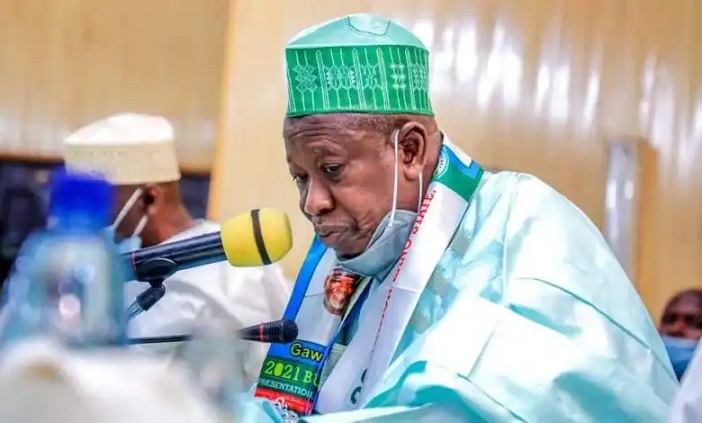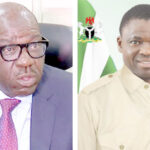The launch last week of a book, Deputising and Governance in Nigeria, written by the governor of Kano State, Dr Abdullahi Umar Ganduje, threw up a lingering problem our political leaders pretend does not exist. I refer to the absence of constitutional roles for state deputy governors. I have not read the book but if Ganduje chose to write and draw public attention to one of the problems making the deepening of our democracy a needlessly herculean task, then he too must have been worried about the problem. I welcome it.
The constitutional position of the deputy governors is worth a critical re-examination as part of the nation’s continuing efforts to respond to the changing times and circumstances in governance in which old thoughts must give way to new and contemporary thoughts on strengthening our democracy and make our national constitution a living document.
Naira redesign: More publicity needed in rural areas
ANA, Vatsa, Mpape and the fruition of a dream
Section 186 of the constitution created the office of deputy governor. It simply provides: “There shall be for each state of the federation a Deputy Governor.” Under Section 187 (1) he is to be elected along with the state governor.
Two things are immediately obvious as potential areas of trouble. Firstly, the constitution created an office with no responsibilities to be discharged by the man who occupies it. Bench warming in such high-profile political office ill serves the nation and its people.
Secondly, the provisions of section 187 (1) make the deputy governor an appendage of the governor. This is the sense in which the state governors understand their position vis-à-vis that of their deputies. All the governors believe that their deputies hold their office at their expressed behest and treat them like common houseboys. Their views and inputs in the decision-making process in governance are neither sought for nor even needed where the relationship between them has gone south.
Under that provision, we actually elect two governors – governor 1 and governor 2. Neither man can legitimately come into office without the other. They are not equal holders of the office of governor. You do not put two captains on one ship, of course. The position of a deputy governor is intended to strengthen the system and ensure that if an incumbent governor suffers the misfortunes of being removed from his exalted office, there will be a smooth transition to keep the system running as intended.
It has not happened. State governors are generally suspicious of their deputies. They see them as people on the death watch, waiting for their principals to either drop dead or be impeached. It is natural for the state governors to feel uneasy about this. The public has not helped matters either. It refers to the deputy governors as spare tyres. The sour and even hostile relationship between the state governors and their deputies makes for dysfunctional state administration.
In the early months of our return to civil rule in 1999, several deputy governors were removed from office, not in accordance with the constitutional provisions but at the instigation of the state governors. The political parties must bear part of the blame because in genuine efforts to balance the tickets, they imposed deputies on their governorship candidates. This brought two incompatible strangers into the respective offices.
In 2014/15, Dr. Mu’azu Babangida Aliyu, the governor of Niger who preferred to go by the talakawa common touch title as Chief Servant, handed over the state administration to the speaker of the state house of assembly as acting governor for the ten days he was away performing the lesser hajj in the holy land. He thus denied the deputy governor, Alhaji Ahmed Musa Ibeto, his legitimate constitutional right to hold the fort in accordance with section 190 of the constitution.
There were no howls of protest over this constitutional travesty because it was nothing new. This sort of cynical side-lining of a deputy governor was more or less the rule rather than the exception in the first four years of our civil rule. In some cases, governors appointed their trusted commissioners as acting governors. The primitive power play was an egregious abuse of the system but we shrugged it off.
At about the same time, the deputy governor of Enugu State was removed from office for what must rank as the most asinine misuse of words. The grave offence of ‘gross misconduct’ that cost him his high-profile job was his raising poultry at his official residence. The offence was not in the chickens but in the foul smell they emitted. I am told that Enugu has since become a perfumed garden.
It is quiet now on the impeachment front, but the lot of the state governors has not improved. They suffer in silence and smile through their serial humiliation and marginalisation in the hands of their principals. Given the silent war between them, state governors do not support their deputies to succeed them. The only exception so far since our return to civil rule in 1999, was Ahmad Sani Yarima, governor of Zamfara State from 1999 – 2007. He supported his deputy, Mahmud Shinkafi’s governorship ambition and ensured that he succeeded him in 2007. Yarima set a worthy example in deepening our democracy, but sadly, he walked a lonely path. No other state governor has walked the same path with him.
We must admit that the system is not working as it should be. It is doing some serious damage to our democracy and our desire to deepen it. Something has to, and must, give. Former President Goodluck Jonathan chaired the book launch under reference. He was deputy governor of Bayelsa State before moving up as governor, vice-president, and president. He has a good grasp of the problems of deputy governors. His solution? He said, “Legal provisions protecting the position of the deputy governor should be strengthened to make the office more functional and secure it from wanton impeachment.”
Ganduje was a deputy governor of Kano State. He said he wrote the book to “share his first-hand experience.” According to him, “the book tells numerous experiences relating to principal and deputy relations in the Nigerian political system, reflecting the successful and evil times; the optimistic and destructive relationships and their consequences for development…”
He traced “…the history of relationships between some governors and their deputies since the First Republic” and argued that they had been characterised by “disloyalty, envy, betrayal, mistrust, ambition which has over the years divided several states of the federation and negatively affected the development of the people who voted the pair into office.”
“This,” he went on in his speech, “should be considered as a matter of national importance, because the resentful relationship is unfavourable to democracy, national peace, stability and development.”
I agree 100 per cent. I commend his decision to write the book and share his experience with the Nigerian public. We do not need spare tyres. We need a system that promotes synergy and a good working relationship between the state governors and their deputies. I would assume that Ganduje has not put his deputy through the same unpleasant experiences as he and other deputy governors have had. He has made a good case for periodic constitutional reviews to replace old thoughts with contemporary new realities. Section 186 of the 1999 constitution as amended as an unfinished business.

 Join Daily Trust WhatsApp Community For Quick Access To News and Happenings Around You.
Join Daily Trust WhatsApp Community For Quick Access To News and Happenings Around You.